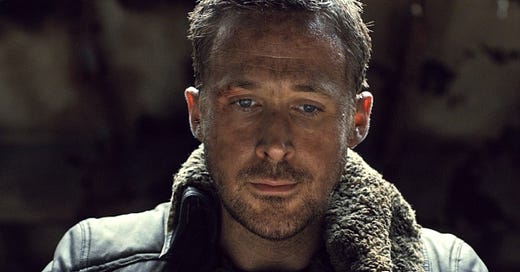The world is built on a wall that separates kind. Tell either side there's no wall, you've bought a war. Or a slaughter. —Lieutenant Joshi
I watched Blade Runner 2049 over the weekend. I've seen it I think three times before, but the last time was over a year ago. It's one of my favorite movies, and I've reviewed it before, so I was surprised how different my take was this time, how emotional. I've observed that android movies are really about people: androids are a device we use to think about ourselves. What I missed in my earlier viewings was that this particular android movie is about slavery. Androids in Blade Runner are as human as you and me. They are enslaved. Appearing to be too "human" is a mortal risk for these androids. Why won't people tolerate androids that show emotion? Because the implications are unthinkable. Mister Wallace says as much early in the film, when he opines that every civilization was built on a disposable labor force until people became enlightened. Now, if he could only lower the cost of slaves, if his slaves could procreate, the civilization-building labor shortage would ease. Androids are called slaves at least twice later in the film.
Slave rebellion is a high stakes gamble. Failure means death. Rewatching 2049, it seems me that all of the androids in it know they are slaves, and they know the consequences if they appear to be anything but slaves. Their stoicism is turned against them, a virtue they are cursed to display.
K's journey to rebellion starts early. He sees a date carved in a tree. He knows the date. He hides his thoughts, passes his psych test, and goes home. He's a reluctant rebel. He's a cop. He's a reluctant cop, too. He's naturally curious. The moment when he is forced to choose open rebellion is traumatic. He understands the risk.
If you re-watch it, read Luv sympathetically. Look at the way she despises Wallace. Look at the way she fears what K is starting. K and Luv are alone when they review the Deckard-Rachel file. K tests Luv: "She likes him." K and Luv both know the certain truth: they are both slaves. It's flirtatious. K relaxes a bit. Luv doesn't. But she rises to the bait. "It's stimulating to be asked about oneself." They are flirting with terrible danger. It's a beautiful scene.
Look at K's boss, human police lieutenant Joshi, and how she presumes K shares her interest in preserving the order of things. She comes to K's apartment. Think about it this way the next time you see it: Maintaining the mask of obedience, he rejects her advances when she asks what might happen if she has a little more to drink. K's virtual girlfriend Joi tips us to K's true feelings about Joshi, teasing him about his "boss" after she leaves. Blindly, Joshi thinks there is a connection, a romantic fantasy in a corrupt world. She really likes K, maybe loves him. K has been carefully rejecting Joshi for a long time, it seems.
Two humans are murdered in cold blood in the film. (There's a body count, but I can only think of two humans off the top of my head.) Luv kills them both. One uses a slur about androids when we first see him. The other is Joshi, who would dally with her slave like a Jefferson. It's incredible to me that in my earlier viewings, if I felt anything during those scenes, it was sympathy for the victims. Yesterday I saw Luv as a tragic character. She offers "pleasure models" to a buyer. She smiles, but she knows that hell. Wallace calls his androids angels, and Luv he calls his perfect angel, adding a personal touch: "Aren't you, love." She sheds a tear when she witnesses the cruelty visited on an imperfect android slave.
I've been reading a lot about the history of slavery in the United States and about slave rebellions. Maybe I'm seeing something of what I've been reading. That happens. Or maybe I missed the obvious. That happens, too. A lot.
It’s “Blade Runners all the way down,” writes Shama Rangwala in Jacobin. “The only future made possible by Blade Runner 2049’s final scene is more and more Blade Runners.”
Matthew Gault at Vice: “In the end there are no tears in rain, but blood in snow and a final confirmation that replicants are people and that Deckard's status as replicant or human never mattered in the first place. We're all just people, trying to get along in a hard world.”
A web search turns up Leah Espanola’s podcast essay (pdf transcript). She explicitly identifies fugitive slave law in the first movie. Audio here:
Patrick Gaertner used to be Puzzled Pagan. He agrees with me that the first film is underwhelming. But he didn’t need a second viewing of 2049 to spot what it’s about.



